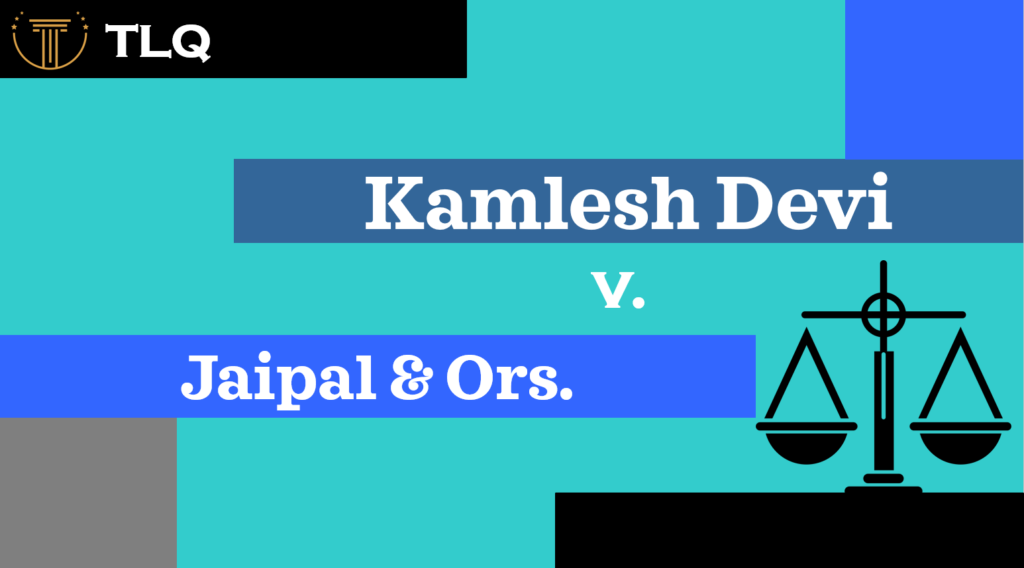Published on 11th April 2025
Authored By: Nishu Singh
Jamia Millia Islamia, New Delhi
Parties Involved:
Petitioner: Ushaben Navinchandra Trivedi and Anr.
Respondent: Bhagyalaxmi Chitra Mandir And Ors.
Court: Gujarat High Court
Citation: AIR1978GUJ13
Facts of the Case
The appellant filed a suit in the city civil court, Ahmedabad, in 1978. The plaintiff claimed a permanent injunction against restraining them from the film “Jai Santoshi Maa” exhibition. The plaintiff argued that the movie hurt the religious sentiments of the Hindus as it shows that 3 deities are envious of Maa Santoshi. After hearing both sides, the city civil court judge discharged the rule on the ground that no legal right of the appellant had been violated. No course of action arises without injury. The trial court refused the temporary injunction, which is challenged in this appeal.
Legal Issues
The primary legal issues addressed by the Supreme Court were:
Whether the certificate for exhibition of the movie granted by the Central Government clothes the production and exhibition of the movie
whether any right of the plaintiff infringed to give the right to file a civil suit?
Arguments
Petitioner’s Arguments (Ushaben and Anr.):
- Sacred Story Sabotage:
o The plaintiff argued that film supposedly rooted in mythology, but its distorted narrative spreads misinformation and offends the sentiments of the faithful.
o The Persons having interest in religion and mythology will get attracted to the movie and when the same is seen by them it will hurt their sentiment.
- Certificate for exhibition:
o The plaintiffs argued that certificate for exhibition provide a security to the production of the production and exhibition of the film, but it must also be noted that the same does not violate the fundamental right provided under Article 25 and Article 26 of the Indian Constitution.
o Section 5 of the Cinematography Act, which provides the certificate for exhibition of movies is in the question in this case.
- Breach of Duty:
o Legal duty or obligation cast upon person or defendant in this case under section 295 and section 295-A of IPC, 1860
o The Plaintiff demands permanent injunction for the infringement of the legal duty by the defendant.
Respondent’s Arguments (Bhagyalaxmi Chitra Mandir and Ors.):
- Filed with malicious intention:
o The defendants have contested that the suit was filed with malicious intention, just to harass the defendant.
o The defendant argue that the suit filed does not fall under Section 9 of the CVC, and hence no legal recourse arises for the same.
o Similar, case has also been filed against the movie “Har Har Mahadev,” by the Plaintiff.
- Entire Film Is Imaginary:
o The defendant argued that the film discloses in the very beginning that the entire film is imaginary.
o The scene showing the gods testing the sincerity of the devotees in the film is normal.
- No violation of religious sentiment:
o There are about 100 prints exhibited, since last four months, till now no complain about hurt of religious feeling or any outrage happened.
o The film maker has the right of expression granted under Article 19 of the Indian Constitution.
- Backed by Certificate of Exhibition:
o The certificate is given by the legitimate authority only after it adhere to the provision of the Cinematography Act.
o Injunction on the same would be infringement of the legal right.
Gujarat High Court’s Analysis and Decision
The Gujarat High Court carefully considered the arguments presented by both parties:
- Certificate of Exhibition:
o The Court evaluated the scene of the movie, in the opinion of the court, no right of the plaintiff has been violated. The film adheres to all the provisions such as Morality, Public Order, or Decency of the Censor Board.
o The mere fact that it shocks the religious sentiment of the audience can’t by itself lead to any cause of action.
- No Legal Injury:
o The Court scrutinized whether there is any legal injury occurred due to this movie. The ingredient for reasons aforesaid in the case has not been established. No course of action arises if there is none existence of legal right.
- No Legal Recourse:
o The Court analysed that the hurt of religious sentiment is not recognised as actionable wrong by court of law. The same is reaffirmed in the case of Khaj Dodda V. Nanjiappa, AIR 1939 Mad 642, where construction of Masjid was allowed even though it was objected that it would hurt the arouse the feelings of Hindus.
Judgment:
The result is that the appeal of the plaintiffs is dismissed and the impugned order of the learned trial Judge is confirmed.
That There shall be no order as to costs of this appeal.
That Appeal was dismissed.
Conclusion
The case of Ushaben Navinchandra Trivedi And Anr. vs Bhagyalaxmi Chitra Mandir And Ors. Set precedent for Damnum Sine Injuria principle. In this case, though there is injury but there is no legal damage. Hence, no course of action arises.



